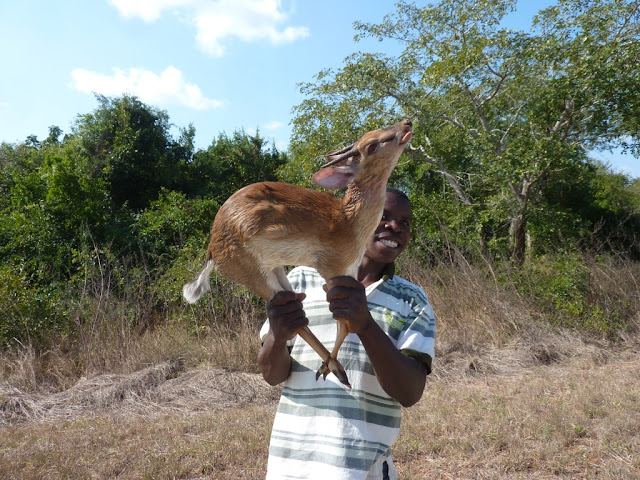Though it seems from this blog that our time here is an unending succession of blissful experiences--that we blithely meander from one unmitigated joy to the next--I must let this particular cat from its bag: sometimes things are less than ideal and we struggle with circumstances in this idyllic place. Three particular recent challenges come to mind today.
We were startled a couple of nights ago to hear a tremendous rumbling noise from in front of the house, accompanied by shouts of conflict. Looking outside, it was clear that one of the raised voices was that of our guard and the rumble from someone pounding on the front gate. As security fear here is of an attack by an armed gang, which would overwhelm an unarmed guard very quickly. I rushed to the open back door to snap the padlock on the steel gate, but found that a missionary earlier in the day had closed the lock (thank you Elder Brogan), and I would need a key to get it open before I could lock the gate. By time I found my keys, I ascertained that we were not dealing with a gang, but a single belligerent in conflict with our guard. I grabbed my weapon of choice (which is to say the only one within easy reach) and headed out.
 |
This is the handle of a hoe, the standard tool of every Mozambican--no one has a shovel. It is made of hardwood and has a little bit of weight behind it. I have carved the handle down a bit so it fits and swings well. It is not a Louisville Slugger but a decent local imitation.
When I reached the front, I was confronted by a very very angry man banging on our front gate with his own stick and yelling at the guard accusing him of a dalliance with his wife. This guy was short, but built like a tank. I entered the conflict and interjected myself between the two--my club playing a prominent role in my positioning. The guy at first appeared drunk but I concluded after a time that it was just fury. I, ever reasonable, explained carefully that it just wasn't so, as he became more threatening and vocal, and so did I. He clearly wanted to remove the head of our guard who he claimed welcomed his wife each night at the chapel--which I knew could not possibly be the case. After some time and some harsh words and toe to toe and club to club confrontation, we got rid of him and I went back in the house. It was the next day, that our daytime guard came to me and told me that the irate husband was absolutely correct. The accusations (which greatly enhanced my Portuguese vocabulary) were accurate. The next day, I went to the house of the offended husband and sincerely apologized--and started looking for a new guard.
|
Our next challenge involved our investigators Macedo and Ines (Ines is pictured here with her daughter). They are the poorest people I have ever known and often have no food. They have never missed attending church in the several months that we have taught them,

We, or rather our educational foundation, offered to get them some training and education in hopes of providing a step up and out of their abject poverty. Macedo began his courses, but Ines' was to begin a little later. When schedules kept getting put off, they finally confessed to us that they had used her tuition money to pay for food and their rent, lying to us for a couple of months to conceal their duplicity. I am really irritated about this--taking it as such a personal affront. But then in rare moments of clarity, we can see now what an impossible position we had placed them in. What would I have done in their place? I do remember that there exists a heirarchy of needs, and food and shelter rank pretty high in the heirarchy. We have many times been warned that money and Mozambicans do not mix well (but of course, we always know better). We are trying to figure out what to do here and trying hard to not let this be a personal issue that will get in the way of why we are here.
 |
| Debbie, Veronica and Santo |
The third is a challenge with an easier solution. We have spoken before here of an interesting phenomenon in our little church in Quelimane. Each Sunday we have between five and fifteen deaf teenage boys that attend. They can understand nothing but they like what they feel here and continue to attend--always respectful and helpful (they put away chairs and pass out hymnbooks). We have no missionaries in the country that speak sign language so we have been at a loss as to what we might do to address their needs. Well, Veronica (pictured above) cannot read or write, but we discovered this week that she has managed to learn sign language. She has no resources nor education, but picked signing up to talk to a neighbor girl. I see a solution in the making here. We really like Veronica, she has joie de vivre which is a rarity among Mozambicans.











































.JPG)
.jpg)
.jpg)
.jpg)
.jpg)
.jpg)
.jpg)
.jpg)
.jpg)
.jpg)
.jpg)
.jpg)
.jpg)
.jpg)
.jpg)
.jpg)
.jpg)
.jpg)
.jpg)
.jpg)
.jpg)
.jpg)
.jpg)
.jpg)
.jpg)
.jpg)
.jpg)
.jpg)